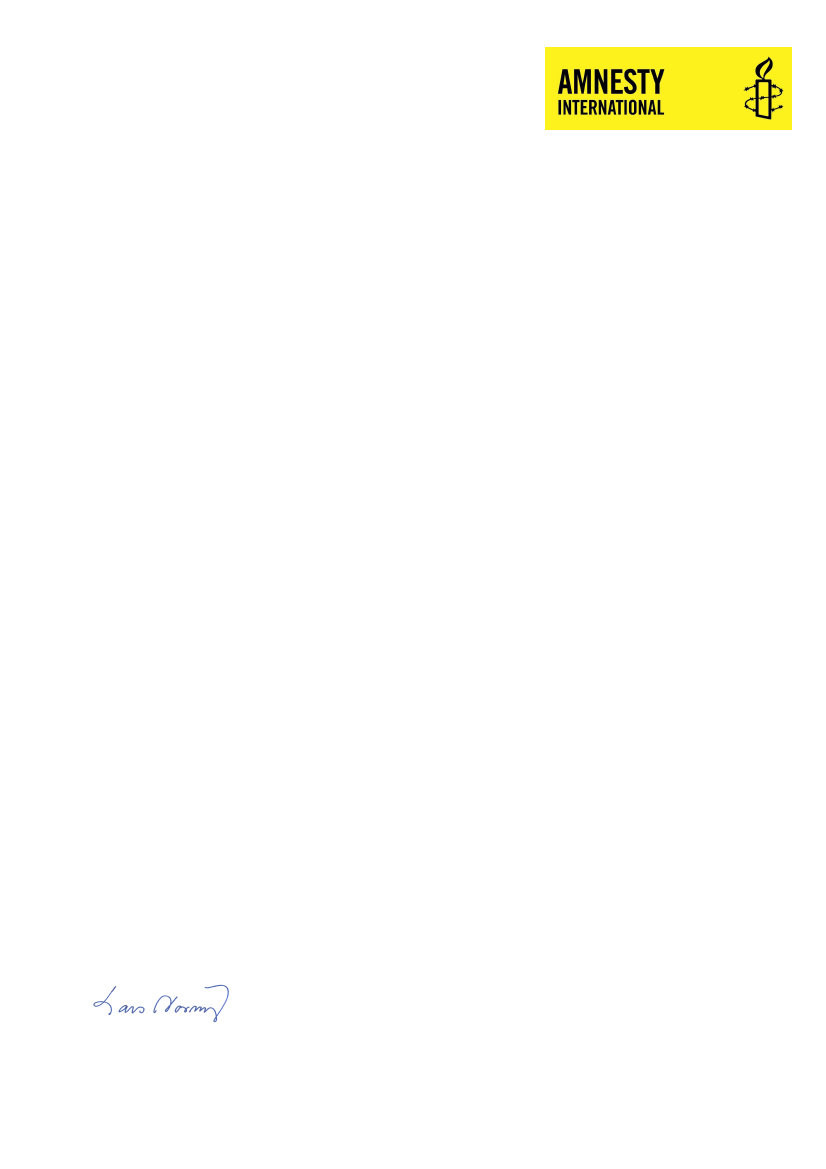
Forsvarsministeriet
Att.: Forsvarsminister Nicolai Wammen
Holmens Kanal 42,
1060 København K
AMNESTY INTERNATIONAL
DANSK AFDELING
Gammeltorv 8, 5. sal
1457 København K
T: 3345 6565
F: 3345 6566
www.amnesty.dk
NATO-topmøde d. 4. – 5. september 2014: Afghanistan og menneskerettigheder
ATO-
27.05.2014
Kære Nicolai Wammen,
Jeg skriver til dig i anledning af det kommende NATO-topmøde d. 4. – 5. september 2014 da vi
er bekendt med, at dagsorden for mødet forhandles i juni måned.
Vi vil gerne opfordre dig til at arbejde for, at menneskerettighederne bliver en central del af
drøftelserne om Afghanistan ved mødet. Derfor vil vi gerne bede dig foreslå, at de følgende
områder og anbefalinger medtages på dagsorden for topmødet. Vi har vedlagt en længere
beskrivelse af vores anbefalinger
Vi mener, at det er endnu mere afgørende, at der bliver fokuseret på, hvordan civile kan
beskyttes, nu når de afghanske styrker overtager ansvaret for de militære operationer. Helt
konkret bør NATO/ISAF assistere den afghanske regering i at udvikle og implementere
beskyttelsesforanstaltninger for civile. Herudover håber vi, at du og dine NATO-kolleger vil
drøfte, hvordan I sikrer, at de fortsatte beskyldninger om strafbare overgreb kan blive
efterforsket, og hvordan de eventuelle skyldige kan stilles til ansvar.
Et andet centralt område er kvinders rettigheder, som traditionelt har ligget danske regeringer
meget på sinde. Vi håber, at I vil sikre, at dette område kommer på dagsorden, bl.a. med fokus
på at sikre kvinders deltagelse i det politiske arbejde, i forhold til offentlige anliggender generelt
og specifikt i forhold til kvinders deltagelse i freds- og forsoningsprocessen. Herudover vil vi
gerne opfordre til, at FN’s Sikkerhedsråds resolution om kvinders rolle i Afghanistan
implementeres.
Vi håber endvidere at spørgsmålet om internt fordrevne vil blive drøftet. Ca. 631.286 afghanere
er internt fordrevne som resultat af konflikterne og de militære operationer. Størstedelen af
internt fordrevne er udsat for adskillige krænkelser af menneskerettighederne, herunder
manglende adgang til helt fundamentale livsfornødenheder som vand, tag over hovedet,
lægehjælp og skolegang.
Endelig vil vi opfordre dig til at arbejde for at sikre, at eventuelle aftaler der måtte blive indgået
på topmødet, ikke kan tjene til at underminere, men snarere styrker menneskerettighederne og
retsstaten i Afghanistan.
Vi står selvfølgelig til rådighed for en eventuelt uddybende drøftelse af vores anbefalinger.
Venlig hilsen
Lars Normann Jørgensen,
Generalsekretær